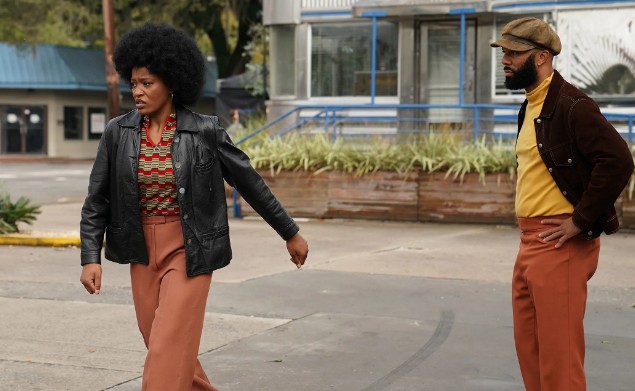The assurance that Krystin Ver Linden’s debut film Alice is based on genuine events lingers in the back of your mind as the movie unfolds and what you believe you’re watching turns out to be something very, very different. In his legendarily bad 1957 space vampire film Plan 9 from Outer Space, Ed Wood even attempted reverse psychology, asking audiences, “Can you prove that it didn’t happen?”
However, a polished slave drama/revenge thriller begs immediate problems of taste and decency: is this the correct medium for a Civil Rights meditation? Surprisingly, Ver Linden’s picture does a fantastic job at walking that fine line. There are flaws, but her cast’s dedication keeps her intentions pure even when the plot falters, which happens frequently.
There’s no way to talk about Alice without exposing the film’s huge twist, which is openly mentioned in promotional materials but occurs 37 minutes into the film. Until then, Alice is a privileged slave on a remote estate commanded by the brutal Paul Bennet with an iron rod (a good, grizzled performance from Jonny Lee Miller).
Alice (Keke Palmer) is settling into married life at the start of the film, dreaming of the life that must be out there someplace. She witnesses the brutalization of her family and friends, and she falls into her master’s bad graces, resulting in her being tied up, beaten, and chained up on the mansion’s lawn overnight. Alice assaults Paul after being released, blinds him in one eye, and flees.
Alice emerges blinking into the sunny glare of a Georgia motorway after a dramatic flight through the woods, where she meets Frank (played by Common), who nearly runs her over when she faints in front of his truck. Frank takes Alice to the hospital, presuming she has a concussion, but when the authorities try to have Alice committed to a psychiatric facility for a mental evaluation, Frank returns and sneaks her out (“That’s where they take you and drill your brains out,” he wisely warns).
Alice discovers the year is 1973, that slavery has been abolished, and that her antagonist Bennet’s sister is listed in the phone book in Frank’s apartment. With sleek clothing and a large, defiant Afro, she also begins the quick but stylish transformation into an avenging angel.
The transition from a fictitious past to a stylized present is effectively handled, but time drags as Alice adjusts to the 1970s, learning about zip fasteners, Sanford and Son, and Pam Grier (“The Baddest Chick Around,” according to Jet magazine), as it always does in these fish-out-of-water scenarios.
Frank puts on the second side of Stevie Wonder’s “Innervisions,” and she’s off, cramming information from an encyclopedia about MLK, Malcolm X, Angela Davis, and others. As the film shifts gears, Alice faces an unrepentant character from her slave past in a coffee shop where everyone speaks about coffee so much that it feels like an odd, subconscious callback to Pam Grier’s 1973 vigilante picture Coffy. It’s quite ingenious if that’s the case.
What’s less brilliant is that, in the next scene, Frank takes Alice to the movies to see Coffy, and, to be honest, the picture never fully recovers from a bizarre merging of reality, fiction, and meta-fiction that even Quentin Tarantino may question.
Despite its weaknesses, Alice is consistently engaging, thanks in large part to Palmer, who carries the film with grace and simplicity in a role that could easily have been played by another actor. The same can be said of Common’s Frank, who comes with so much baggage that his overbearing, Nixon-supporting big brother is the least of his concerns.
Ironically, it’s these attempts to tame the film’s wilder B-movie elements that bring it down, and after one gets over their first apprehensions about the film’s appropriateness, it’s evident that Alice might have been a little—or maybe a lot—more out there. It’s not quite Django Unchained out there, but it’s certainly braver.
Before she embarks on her final, raging fury, Alice is warned, “Freedom is a term you will never understand in a million years.” “I am freedom,” she retorts.






https://doxycyclinebestprice.pro/
lisinopril 20 https://lisinoprilbestprice.store/ lisinopril pharmacy online
zestoretic cost https://lisinoprilbestprice.store/ buy lisinopril online canada
tamoxifen and osteoporosis https://nolvadex.fun/ alternative to tamoxifen
nolvadex d https://nolvadex.fun/ nolvadex side effects
hysterectomy after breast cancer tamoxifen https://nolvadex.fun/ tamoxifen medication
indian pharmacy online https://indianpharmacy.shop/# – pharmacy website india indianpharmacy.shop
top online pharmacy india https://indianpharmacy.shop/# – world pharmacy india indianpharmacy.shop
canadian pharmacy india https://indianpharmacy.shop/# – reputable indian online pharmacy indianpharmacy.shop
pharmacy website india https://indianpharmacy.shop/# – buy medicines online in india indianpharmacy.shop
best canadian pharmacy online https://canadianpharmacy.pro/# – canadian drug pharmacy canadianpharmacy.pro
canadian neighbor pharmacy https://canadianpharmacy.pro/# – canadian pharmacy world canadianpharmacy.pro
best canadian pharmacy https://canadianpharmacy.pro/# – canadian medications canadianpharmacy.pro
online canadian drugstore https://canadianpharmacy.pro/# – canadian pharmacy prices canadianpharmacy.pro
reliable canadian pharmacy https://canadianpharmacy.pro/# – canadian pharmacy ltd canadianpharmacy.pro
online pharmacy canada https://canadianpharmacy.pro/# – canadian drugstore online canadianpharmacy.pro
canada drugs online review https://canadianpharmacy.pro/# – canadianpharmacymeds canadianpharmacy.pro
canadian rx pharmacy online https://canadadrugs.pro/# – online pharmacies canadian canadadrugs.pro
internet pharmacy https://canadadrugs.pro/# – certified canadian pharmacies canadadrugs.pro
international pharmacies that ship to the usa https://canadadrugs.pro/# – canadian trust pharmacy canadadrugs.pro
prescription prices https://canadadrugs.pro/# – pharmacy review canadadrugs.pro
canadian pharmacies recommended https://canadadrugs.pro/# – buying drugs canada canadadrugs.pro
mexican pharmacies shipping to usa https://canadadrugs.pro/# – northeast discount pharmacy canadadrugs.pro
canadian pharmaceuticals online safe https://canadadrugs.pro/# – canadian pharmacy presription and meds canadadrugs.pro
canadian meds without a script https://canadadrugs.pro/# – canadian pharmacy online canadadrugs.pro
pain meds online without doctor prescription https://canadadrugs.pro/# – us online pharmacy canadadrugs.pro
mexican pharmacy online https://canadadrugs.pro/# – no prescription canadian pharmacies canadadrugs.pro
canadianpharmacymeds com https://canadianinternationalpharmacy.pro/ cheapest pharmacy canada
canadian pharmacy india https://canadianinternationalpharmacy.pro/ canada drugs online reviews
canadian neighbor pharmacy https://canadianinternationalpharmacy.pro/ online pharmacy canada
best rated canadian pharmacy https://canadianinternationalpharmacy.pro/ canadian pharmacy
canada drug pharmacy https://canadianinternationalpharmacy.pro/ northwest pharmacy canada
canadian drugs pharmacy https://canadianinternationalpharmacy.pro/ canadian pharmacy
canada pharmacy world https://canadianinternationalpharmacy.pro/ rate canadian pharmacies
canadian online drugstore https://canadianinternationalpharmacy.pro/ canadian pharmacy scam
canadian pharmacies that deliver to the us https://canadianinternationalpharmacy.pro/ buy drugs from canada
mexico drug stores pharmacies https://certifiedpharmacymexico.pro/ mexican drugstore online
best online pharmacies in mexico https://certifiedpharmacymexico.pro/ purple pharmacy mexico price list
medication from mexico pharmacy https://certifiedpharmacymexico.pro/ mexican border pharmacies shipping to usa
ciprofloxacin 500mg buy online https://cipro.guru/ buy cipro cheap
cipro for sale https://cipro.guru/ cipro online no prescription in the usa
cipro for sale https://cipro.guru/ cipro
ciprofloxacin generic https://cipro.guru/ antibiotics cipro
buy cipro online https://cipro.guru/ ciprofloxacin over the counter
antibiotics cipro https://cipro.guru/ cipro generic
buy ciprofloxacin https://cipro.guru/ cipro
ciprofloxacin over the counter https://cipro.guru/ antibiotics cipro
ciprofloxacin 500mg buy online https://cipro.guru/ cipro for sale
buy generic ciprofloxacin https://cipro.guru/ cipro generic
https://doxycycline.auction/
Sweetie Fox izle https://sweetiefox.online/ – Sweetie Fox filmleri
Sweetie Fox filmleri https://sweetiefox.online/ – sweeti fox
sweety fox https://sweetiefox.online/ – swetie fox
Sweetie Fox https://sweetiefox.online/ – Sweetie Fox modeli
Sweetie Fox modeli https://sweetiefox.online/ – sweeti fox
sweeti fox https://sweetiefox.online/ – sweeti fox
Sweetie Fox video https://sweetiefox.online/ – sweeti fox
hz9952 sweetie fox https://sweetiefox.pro/ – sweetie fox new
MxivlI fox sweetie https://sweetiefox.pro/ – sweetie fox full video
1AfRmM fox sweetie https://sweetiefox.pro/ – sweetie fox new
OEnkY9 sweetie fox full https://sweetiefox.pro/ – sweetie fox full
wZWhdH sweetie fox cosplay https://sweetiefox.pro/ – sweetie fox
ntBk5r sweetie fox video https://sweetiefox.pro/ – sweetie fox video
dB0nN6 fox sweetie https://sweetiefox.pro/ – sweetie fox video
E3XeGs sweetie fox video https://sweetiefox.pro/ – sweetie fox new
f31Azn sweetie fox cosplay https://sweetiefox.pro/ – ph sweetie fox
mia malkova videos: https://miamalkova.life/ mia malkova latest
mia malkova movie: https://miamalkova.life/ mia malkova only fans
mia malkova girl: https://miamalkova.life/ mia malkova only fans
mia malkova: https://miamalkova.life/ mia malkova photos
mia malkova hd: https://miamalkova.life/ mia malkova photos
mia malkova girl: https://miamalkova.life/ mia malkova girl
mia malkova latest: https://miamalkova.life/ mia malkova hd
mia malkova new video: https://miamalkova.life/ mia malkova videos
mia malkova hd: https://miamalkova.life/ mia malkova girl
mia malkova videos: https://miamalkova.life/ mia malkova movie
mia malkova new video: https://miamalkova.life/ mia malkova photos
mia malkova videos: https://miamalkova.life/ mia malkova girl
mia malkova full video: https://miamalkova.life/ mia malkova girl
pin up aviator: https://aviatoroyunu.pro aviator oyunu
aviator hilesi: https://aviatoroyunu.pro aviator hilesi
pin up aviator: https://aviatoroyunu.pro aviator bahis
aviator oyunu: https://aviatoroyunu.pro aviator hilesi
aviator oyna: https://aviatoroyunu.pro aviator oyna
pin up aviator: https://aviatoroyunu.pro aviator hilesi
aviator bahis: https://aviatoroyunu.pro pin up aviator
aviator https://aviatormalawi.online – aviator malawi
aviator bet https://aviatormalawi.online – play aviator
aviator bet malawi login https://aviatormalawi.online – aviator bet malawi
aviator betting game https://aviatormalawi.online – aviator bet
aviator bet malawi https://aviatormalawi.online – aviator bet
aviator game online https://aviatormalawi.online – aviator bet malawi login
aviator https://aviatormalawi.online – aviator betting game
pin up bet https://pinupcassino.pro/ pin up casino
pin-up casino https://pinupcassino.pro/ aviator pin up casino
pin up cassino online https://pinupcassino.pro/ pin-up casino entrar
pin-up casino entrar https://pinupcassino.pro/ pin up bet
pin-up https://pinupcassino.pro/ pin up aviator
cassino pin up https://pinupcassino.pro/ cassino pin up
pin-up casino https://pinupcassino.pro/ pin-up casino login
jogo de aposta – https://jogodeaposta.fun/ ganhar dinheiro jogando
aviator jogo de aposta – https://jogodeaposta.fun/ depósito mínimo 1 real
site de apostas – https://jogodeaposta.fun/ jogo de aposta
jogo de aposta online – https://jogodeaposta.fun/ ganhar dinheiro jogando
jogo de aposta online – https://jogodeaposta.fun/ aplicativo de aposta
aplicativo de aposta – https://jogodeaposta.fun/ jogos que dão dinheiro
aplicativo de aposta – https://jogodeaposta.fun/ melhor jogo de aposta para ganhar dinheiro
gates of olympus oyna demo – https://gatesofolympus.auction/ gates of olympus demo türkçe oyna
gates of olympus nasıl para kazanilir – https://gatesofolympus.auction/ gates of olympus hilesi
gates of olympus taktik – https://gatesofolympus.auction/ pragmatic play gates of olympus
gate of olympus hile – https://gatesofolympus.auction/ gates of olympus hilesi
gates of olympus giriş – https://gatesofolympus.auction/ gates of olympus giriş
deneme bonusu veren siteler https://slotsiteleri.guru/ en çok kazandiran slot siteleri
en iyi slot siteleri https://slotsiteleri.guru/ en güvenilir slot siteleri
aviator oyunu 20 tl https://aviatoroyna.bid – aviator hile
aviator oyna 20 tl https://aviatoroyna.bid – aviator oyunu
aviator https://aviatoroyna.bid – aviator sinyal hilesi
aviator mostbet https://aviatoroyna.bid – aviator nasıl oynanır
aviator nasıl oynanır https://aviatoroyna.bid – aviator hilesi
reputable indian pharmacies: indian pharmacies safe world pharmacy india indianpharmacy.icu
pharmacy website india: buy prescription drugs from india best online pharmacy india indianpharmacy.icu
canadian pharmacy ratings: canadian pharmacy com reddit canadian pharmacy canadianpharmacy24.store
canadian pharmacy: canadian drug prices online pharmacy canada canadianpharmacy24.store
casino trực tuyến việt nam http://casinvietnam.shop/# – đánh bài trực tuyến
casino online uy tín https://casinvietnam.com/# – casino trực tuyến việt nam
casino trực tuyến uy tín http://casinvietnam.shop/# – casino online uy tín
game cờ bạc online uy tín https://casinvietnam.shop/# – casino trực tuyến uy tín
cost generic propecia for sale https://finasteride.store/ get propecia tablets
buying cheap propecia prices https://finasteride.store/ generic propecia no prescription
cost propecia without a prescription https://finasteride.store/ buying propecia online
get cheap propecia https://finasteride.store/ get cheap propecia without a prescription
cipro generic https://ciprofloxacin.tech/ ciprofloxacin order online
hey there and thank you for your info – I have definitely picked up anything new
from right here. I did however expertise some technical issues using this website, since I experienced to reload
the website a lot of times previous to I could get it
to load properly. I had been wondering if your web hosting is OK?
Not that I am complaining, but sluggish loading instances times will very frequently affect your placement in google and could damage your high-quality score if advertising and
marketing with Adwords. Well I am adding this RSS to my e-mail and can look out for much more of your respective exciting content.
Make sure you update this again very soon.. Escape rooms hub
You have mentioned very interesting points! ps decent site.?
I needed to thank you for this fantastic read!! I absolutely enjoyed every bit of it. I’ve got you saved as a favorite to check out new stuff you post…
Hi, I do think this is an excellent website. I stumbledupon it 😉 I may revisit once again since I bookmarked it. Money and freedom is the greatest way to change, may you be rich and continue to guide others.
This is a topic that is close to my heart… Best wishes! Where can I find the contact details for questions?
I need to to thank you for this good read!! I certainly loved every little bit of it. I’ve got you bookmarked to look at new things you post…
bookmarked!!, I love your web site!
Excellent blog you’ve got here.. It’s hard to find quality writing like yours nowadays. I honestly appreciate people like you! Take care!!
You need to take part in a contest for one of the highest quality websites on the net. I’m going to recommend this web site!
I blog often and I really appreciate your content. This great article has really peaked my interest. I will book mark your blog and keep checking for new information about once per week. I opted in for your RSS feed as well.
Very good write-up. I absolutely appreciate this site. Stick with it!
Howdy! This post could not be written any better! Looking through this article reminds me of my previous roommate! He constantly kept talking about this. I most certainly will forward this post to him. Fairly certain he’s going to have a good read. I appreciate you for sharing!
I couldn’t refrain from commenting. Perfectly written!
Excellent blog you’ve got here.. It’s hard to find quality writing like yours nowadays. I honestly appreciate people like you! Take care!!
After looking into a few of the articles on your blog, I really like your way of blogging. I book marked it to my bookmark site list and will be checking back soon. Please visit my web site too and tell me your opinion.
Hello there! This article couldn’t be written any better! Looking through this article reminds me of my previous roommate! He constantly kept preaching about this. I will forward this post to him. Fairly certain he will have a good read. Thanks for sharing!
You are so awesome! I do not think I’ve truly read anything like this before. So nice to discover someone with unique thoughts on this subject. Seriously.. many thanks for starting this up. This site is something that is needed on the internet, someone with a bit of originality.
This web site really has all of the information I needed concerning this subject and didn’t know who to ask.
Good post. I learn something new and challenging on blogs I stumbleupon on a daily basis. It’s always helpful to read content from other authors and use something from other sites.
Nice post. I learn something totally new and challenging on blogs I stumbleupon everyday. It will always be exciting to read through content from other writers and use something from their websites.
Next time I read a blog, Hopefully it doesn’t disappoint me just as much as this particular one. After all, Yes, it was my choice to read, but I genuinely believed you’d have something useful to talk about. All I hear is a bunch of whining about something that you could fix if you weren’t too busy seeking attention.
Oh my goodness! Amazing article dude! Many thanks, However I am experiencing troubles with your RSS. I don’t know why I can’t join it. Is there anyone else getting the same RSS problems? Anyone who knows the solution will you kindly respond? Thanks!!
Having read this I thought it was rather informative. I appreciate you taking the time and effort to put this informative article together. I once again find myself spending a significant amount of time both reading and commenting. But so what, it was still worth it.
There’s certainly a lot to find out about this issue. I like all the points you’ve made.
Great article. I am experiencing some of these issues as well..
Aw, this was an extremely nice post. Finding the time and actual effort to create a great article… but what can I say… I procrastinate a lot and never seem to get anything done.
This website was… how do you say it? Relevant!! Finally I have found something which helped me. Thanks!
I quite like reading an article that will make people think. Also, many thanks for allowing me to comment.
This blog was… how do you say it? Relevant!! Finally I’ve found something which helped me. Cheers.
After exploring a few of the articles on your web site, I truly like your way of writing a blog. I added it to my bookmark website list and will be checking back in the near future. Please check out my website as well and tell me how you feel.